Overview
Influencer communities are pivotal in shaping consumer behavior and enhancing brand visibility through authentic engagement and trust. Notably, these communities, particularly those involving micro and nano-influencers, wield significant influence over purchasing decisions. In fact, 63% of consumers are likely to buy products recommended by trusted influencers. This statistic underscores their profound impact on marketing strategies, highlighting the necessity for brands to integrate influencer partnerships into their campaigns.
Introduction
Influencer communities have emerged as formidable networks that significantly shape consumer behavior and drive marketing success in an increasingly digital landscape. These groups, defined by their shared interests and authentic connections, present brands with an invaluable opportunity to engage with audiences on a deeper level. However, as the influencer marketing space becomes more saturated, brands encounter the challenge of effectively navigating these communities.
How can they ensure that their partnerships resonate authentically and yield the desired impact?
Defining Influencer Communities: What They Are and Their Importance
Influencer communities consist of dynamic networks of individuals united by shared interests, passions, or demographics, actively engaging with content creators across various platforms. These groups play a pivotal role in shaping consumer behavior and influencing product perception. They cultivate trust and authenticity, enabling companies to forge deeper connections with their target audiences. As marketing through social media figures continues to expand, understanding influencer communities becomes essential for brands aiming to amplify the impact of their partnerships with key personalities.
Data reveals that 69% of buyers trust recommendations from social media personalities, significantly influencing their purchasing decisions. Additionally, 75% of individuals turn to social media for buying advice, underscoring the importance of these groups in steering consumer choices. Successful brands leverage influencer communities by fostering authentic relationships, thereby enhancing credibility and encouraging genuine engagement.
Moreover, social media groups can yield substantial returns on investment; companies typically receive an average of $5.78 for every dollar spent on marketing through social media personalities. This underscores the effectiveness of engaging with influencer communities, as they not only amplify messages but also create a sense of belonging among individuals. By harnessing the power of influencer communities, brands can effectively influence consumer behavior and refine their overall marketing strategies.
In this landscape, Creator Check emerges as a vital tool for streamlining agency operations for content creators. With enterprise-grade encryption ensuring data privacy and compliance with GDPR, Creator Check enhances revenue and simplifies management through its AI-driven solutions. It empowers agencies to manage multiple inboxes from various providers and facilitates seamless searches across all creator emails. Furthermore, the Brand Book feature aids agencies in maintaining consistent branding throughout their collaborations. By reducing the time spent on administrative tasks, Creator Check enables agencies to focus on securing brand agreements and nurturing relationships within these influential groups.
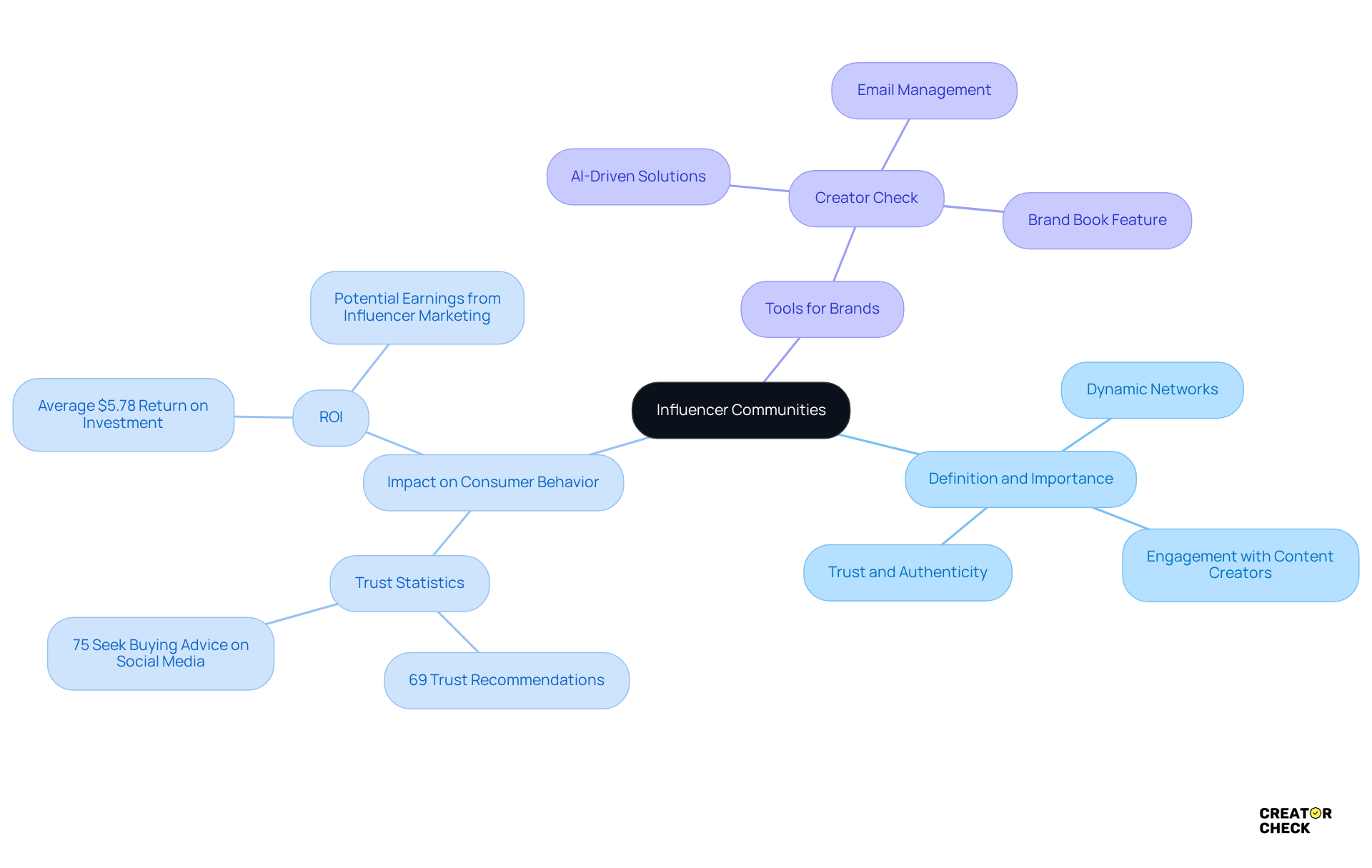
The Evolution of Influencer Communities: Historical Context and Relevance
The evolution of social media circles has undergone a remarkable transformation since the inception of social platforms. Initially, these platforms were predominantly occupied by celebrities and public figures with extensive followings. However, the landscape has significantly shifted with the emergence of platforms like Instagram, TikTok, and YouTube. This evolution has given rise to micro and nano-influencers, who, despite their smaller follower counts, command highly engaged audiences. Research indicates that over 75% of Instagram's influencer base comprises nano-influencers, recognized for their authentic connections with followers. This trend has cultivated influencer communities where authenticity and relatability are prioritized over sheer follower numbers.
As brands increasingly acknowledge the impact of these engaged audiences, they are adapting their marketing strategies accordingly. In fact, 63% of buyers are likely to purchase products recommended by trusted influencers, underscoring the effectiveness of micro and nano-influencers in influencing purchasing decisions. The rise of these influencers and their engagement in influencer communities is not merely a transient trend; it signifies a broader shift in marketing dynamics, where authentic relationships and audience involvement are becoming essential. By 2025, the marketing sector is projected to reach an impressive $32.55 billion, emphasizing the growing importance of these groups in shaping narratives and consumer behavior.
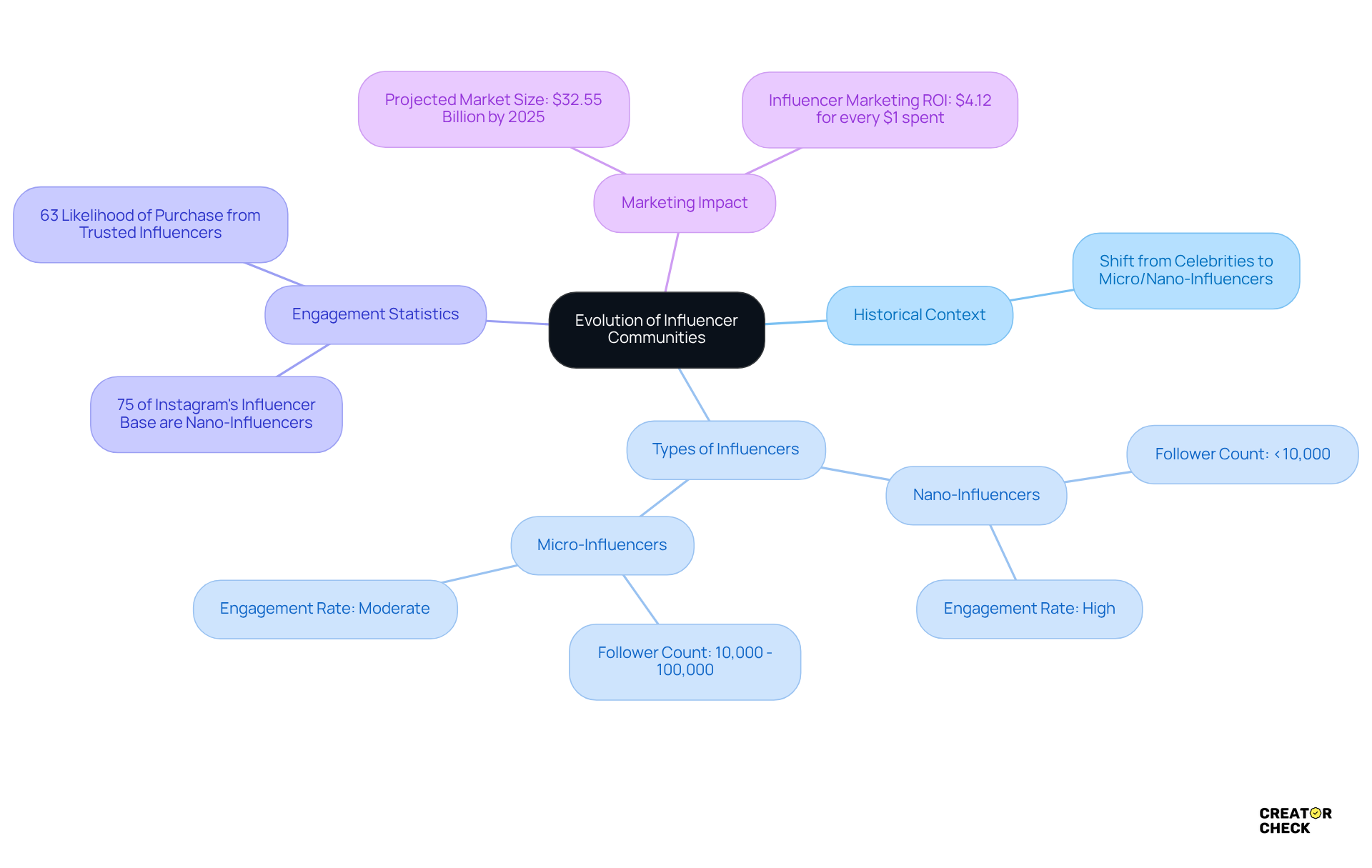
Key Characteristics of Influencer Communities: Structure and Roles
Influencer communities are intricately organized around a dynamic interaction involving influencers, followers, and brands. Influencers serve as pivotal figures, crafting content that resonates profoundly with their audience, thereby fostering a loyal following. This trust is paramount, as 95% of individuals are more inclined to trust recommendations from others rather than branded content, even if they are unfamiliar with the source. Followers actively engage with the content, providing feedback and sharing experiences that further solidify their connection to the influencer.
Brands recognize the immense potential of influencer communities and frequently collaborate with influencers to leverage their extensive reach and credibility. Successful collaborations can significantly enhance product visibility and authenticity. For instance, Tentree, a company dedicated to sustainability, has effectively cultivated a network of advocates that align with its values, resulting in more authentic content and improved marketing outcomes.
The involvement rates within these groups are striking; research indicates that companies collaborating with influencers who possess larger audiences experience a 9.2% enhanced return on investment. This underscores the efficacy of marketing through individuals as a robust avenue for companies aiming to engage with consumers on a personal level. By nurturing these relationships, brands can foster influencer communities that not only drive sales but also cultivate long-term loyalty and trust. Furthermore, the marketing sector involving social media personalities was valued at $21.1 billion as of 2023, having tripled in size since 2019, with projections to reach $24 billion by the end of 2024. This growth highlights the increasing significance of marketing through social media personalities.
Moreover, platforms such as Creator Check enhance these collaborations by optimizing agency functions through AI-driven solutions. With features like enterprise-grade encryption for data security, the capability to manage multiple inboxes from various providers, and the Brand Book feature, Creator Check streamlines management tasks. Agencies can also search across all creator emails simultaneously, allowing them to focus on securing higher-paying sponsorship deals for creators. The AI negotiator feature, which drafts smarter counter-offers, exemplifies how Creator Check can boost revenue while ensuring compliance with data protection standards. Long-term connections with influencers are essential, as they yield maximum ROI and affinity for the brand, underscoring the importance of nurturing influencer networks.
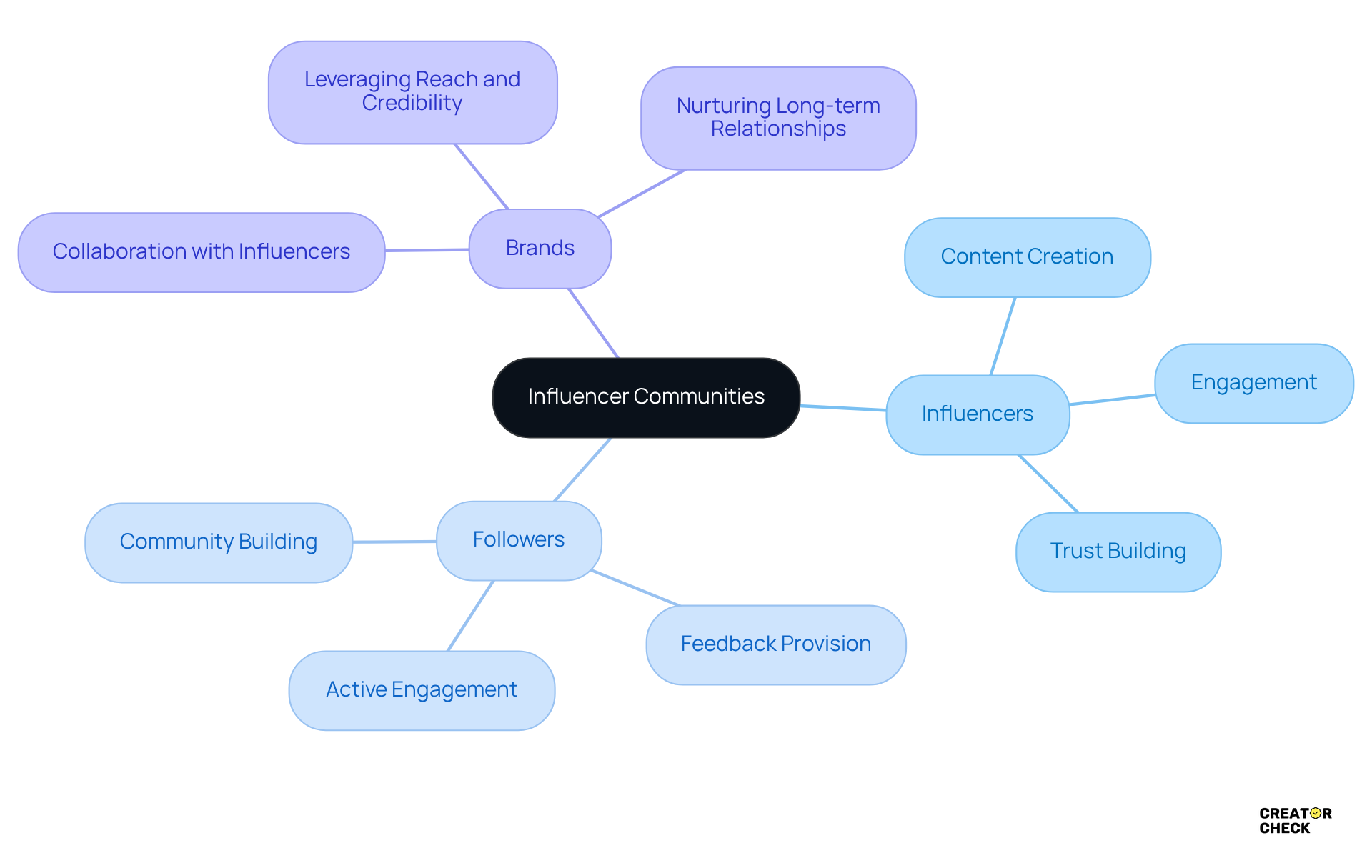
The Impact of Influencer Communities: Benefits for Brands and Creators
Influencer communities offer significant advantages for both companies and creators. For companies, collaborating with influencers fosters authentic engagement with target audiences, which is crucial for enhancing visibility and loyalty. Research indicates that 63% of consumers are likely to purchase products recommended by trusted influencers, highlighting the effectiveness of these partnerships in driving conversion rates. Furthermore, companies that cultivate strong networks of promoters often observe a return of $4.12 for every $1 invested in promotional campaigns, illustrating the financial benefits of such collaborations.
For creators, participation in a network of social media personalities opens doors to collaboration, growth, and revenue generation. Successful partnerships can nurture long-term relationships that bolster a creator's credibility and broaden their reach. This is particularly evident in the rise of micro-influencers, who frequently achieve higher engagement rates due to their closer ties with their audiences. Overall, influencer communities serve as a vital link between companies and consumers, fostering relationships that drive business success and enhance loyalty.
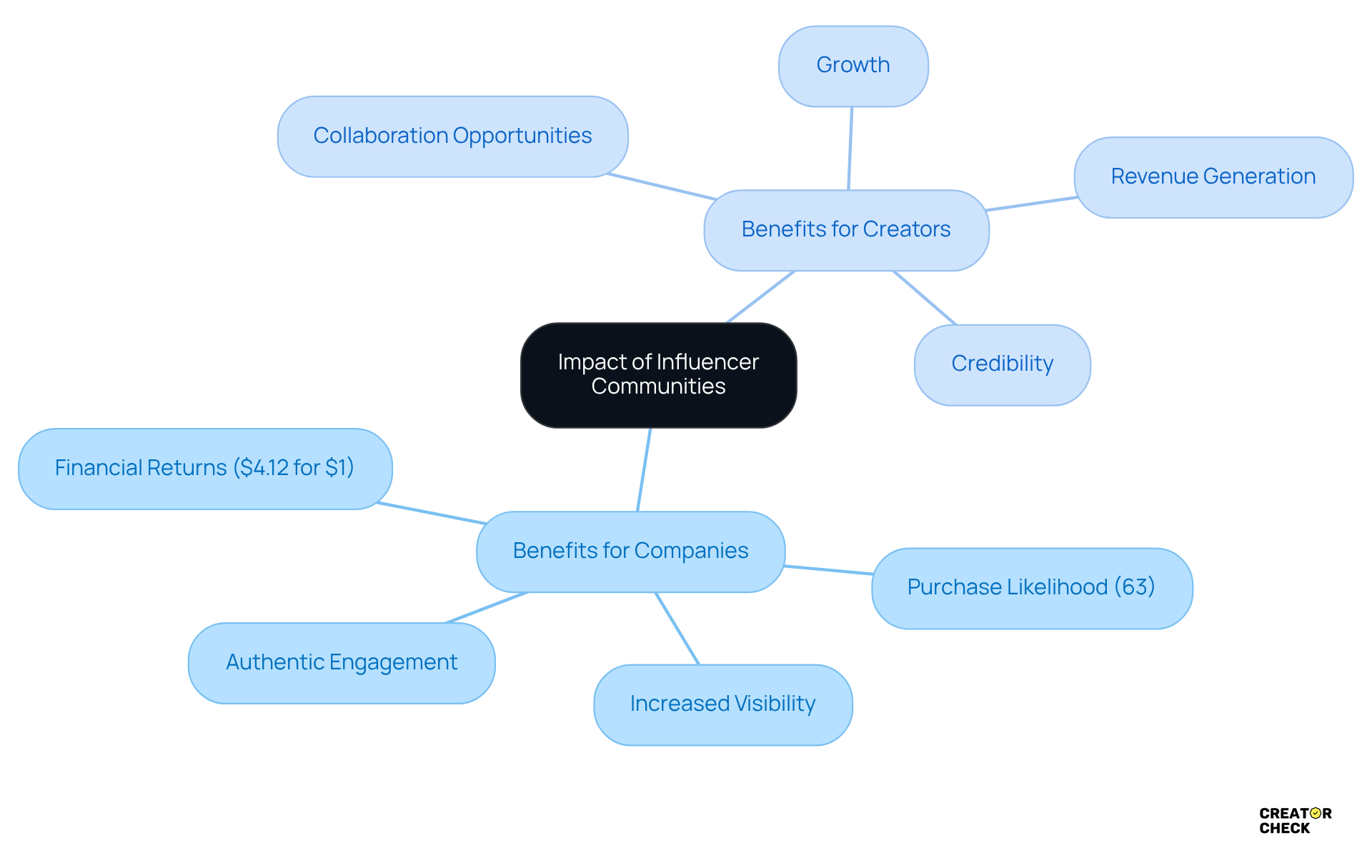
Challenges in Navigating Influencer Communities
Influencer communities offer significant opportunities, but they also present notable challenges for companies. A primary challenge lies in identifying influencers whose values align with the organization's mission and resonate with the target audience. As the marketing landscape grows increasingly saturated, organizations risk encountering audience fatigue, which can diminish their visibility and influence. A recent study reveals that 38.4% of companies are shifting focus from vanity metrics to measurable ROI, underscoring the necessity for authenticity in partnerships. If consumers perceive a partnership as insincere, it can tarnish the reputations of both the company and the influencer involved.
To adeptly navigate these challenges, companies must prioritize comprehensive research to identify the right influencers and cultivate genuine relationships that extend beyond transactional interactions. Consistent engagement with their communities is crucial for maintaining relevance and trust. Experts emphasize that establishing long-term, value-oriented relationships is essential, as this approach not only enhances customer loyalty but also fosters deeper engagement. By concentrating on authenticity and strategic alignment, brands can effectively overcome the challenges posed by influencer communities.
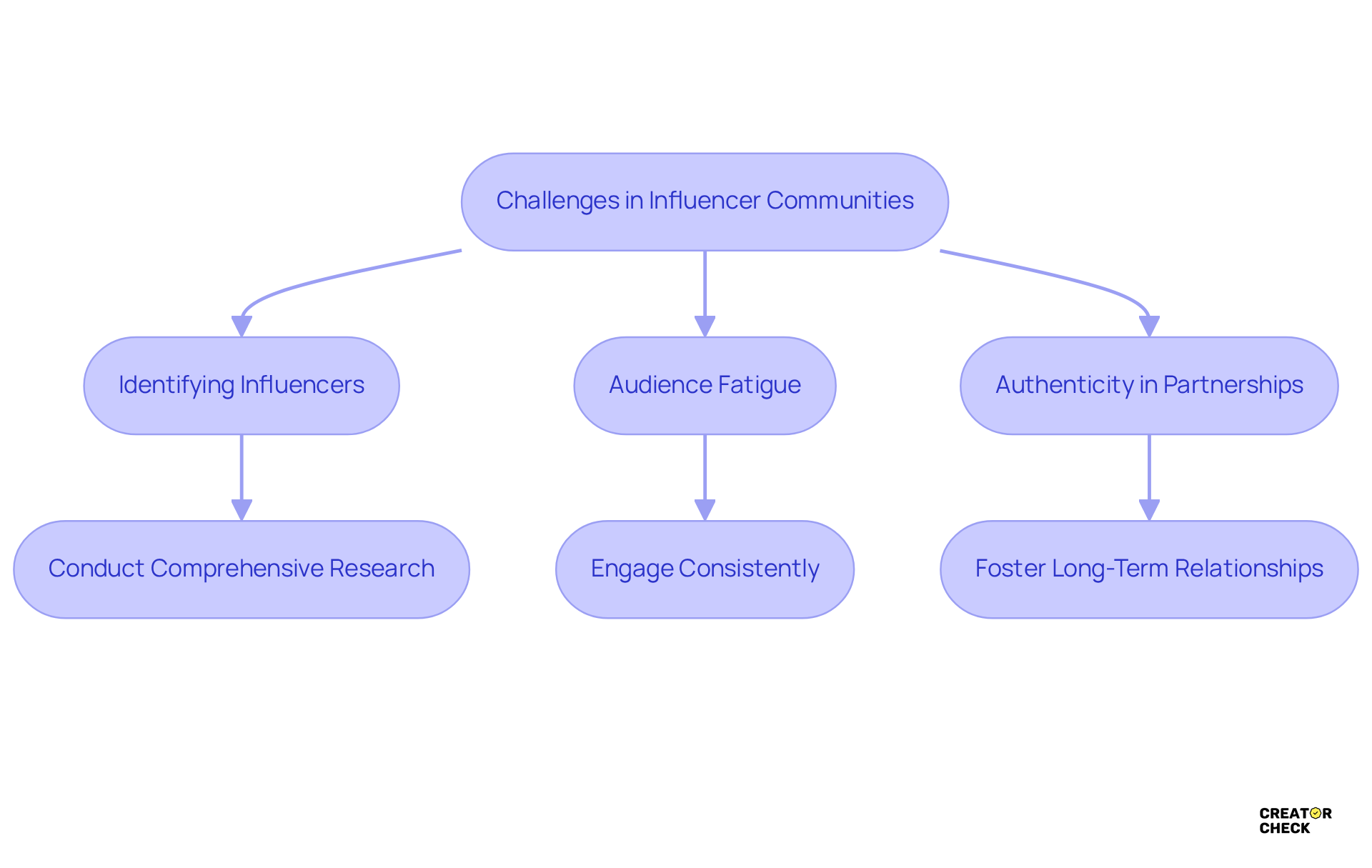
Conclusion
Understanding influencer communities is essential for brands aiming to navigate the modern marketing landscape effectively. These communities, defined by shared interests and active engagement with content creators, play a significant role in shaping consumer behavior and brand perception. By cultivating authentic relationships with influencers, companies can bolster their credibility, foster consumer trust, and ultimately sway purchasing decisions.
The article presents critical insights into the dynamics of influencer communities, illustrating their evolution from celebrity-driven networks to the emergence of micro and nano-influencers who prioritize authenticity. Compelling statistics reveal that a majority of consumers trust recommendations from influencers, underscoring the necessity for brands to adapt their strategies to leverage these engaged audiences. Furthermore, the role of tools like Creator Check in optimizing agency operations highlights the importance of efficient management in maximizing the potential of influencer collaborations.
In conclusion, the influence of influencer communities transcends mere marketing; it signifies a shift towards more genuine interactions between brands and consumers. As the marketing sector continues to evolve, embracing the authenticity and relatability offered by these communities will be paramount. Companies are urged to invest in building long-term relationships with influencers, emphasizing authenticity and strategic alignment, to effectively navigate challenges and harness the full potential of these dynamic networks.
Frequently Asked Questions
What are influencer communities?
Influencer communities are dynamic networks of individuals united by shared interests, passions, or demographics, who actively engage with content creators across various platforms. They play a crucial role in shaping consumer behavior and influencing product perception.
Why are influencer communities important for brands?
Influencer communities cultivate trust and authenticity, enabling brands to forge deeper connections with their target audiences. They significantly influence purchasing decisions, with 69% of buyers trusting recommendations from social media personalities.
How do social media personalities impact consumer behavior?
A significant 75% of individuals turn to social media for buying advice, highlighting the role of influencer communities in steering consumer choices. Successful brands leverage these communities to enhance credibility and encourage genuine engagement.
What is the return on investment for marketing through influencer communities?
Companies typically receive an average of $5.78 for every dollar spent on marketing through social media personalities, demonstrating the effectiveness of engaging with influencer communities.
How has the landscape of influencer communities evolved?
Initially dominated by celebrities, the landscape has shifted with the rise of platforms like Instagram, TikTok, and YouTube, leading to the emergence of micro and nano-influencers who have highly engaged audiences. Over 75% of Instagram's influencer base consists of nano-influencers known for their authentic connections.
What is the significance of micro and nano-influencers in marketing?
Research indicates that 63% of buyers are likely to purchase products recommended by trusted influencers, underscoring the effectiveness of micro and nano-influencers in influencing purchasing decisions and highlighting a shift towards authenticity in marketing.
What is Creator Check, and how does it assist agencies?
Creator Check is a tool designed to streamline agency operations for content creators, enhancing revenue and simplifying management through AI-driven solutions. It helps agencies manage multiple inboxes, facilitates searches across creator emails, and maintains consistent branding during collaborations.
What is the projected growth of the marketing sector related to influencer communities?
The marketing sector is projected to reach $32.55 billion by 2025, emphasizing the growing importance of influencer communities in shaping narratives and consumer behavior.




